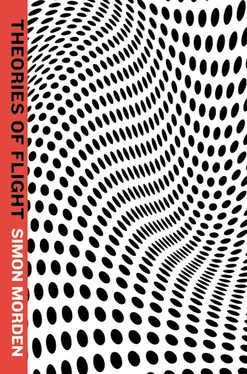Petrovitch backed away from the gate and popped the lid of the boot. When he closed it again, he was feeding cartridges into an automatic shotgun. “You called for help?” he asked.
“I’ve done that.” Chain looked up at the buildings either side of the concrete road. “They may be some time.”
“Well,” said Petrovitch, sitting down on the warm bonnet, “I can wait.”
“Aren’t you coming?” Chain looked back at him.
“This is well beyond my pay-grade, Chain. When it’s safe, you can call me.”
Chain dithered for a moment, grinding his heel against the loose grit. He shrugged his shoulders and started to walk.
The explosion started small: a white flash of light behind a ground-floor window. The walls flicked off a coat of dust and started to swell, like they were taking in a mighty breath. Then they failed in a roar of black smoke and orange fire. The roof was briefly in the sky, all in one piece, girders and corrugated iron sheets. It peeled apart and started to fall back to earth, one sharp spinning piece after another.
Petrovitch rolled back, turning. He was crouched on the top of the car. Things were flying toward him, rather quicker than he could run. He jumped, and the blast caught him while he was still in the air.
He was thrown down like a doll, and the ground was very hard indeed.
7

H e could taste blood, and he was certain it was his. Dust and smoke swirled all around: his lungs were full of it, and the skin on his face was scrubbed wet by the rough road. His ears were ringing.
Petrovitch lay there and blinked, trying to make sense of what had just happened. His glasses were awry, and he dragged a hand out from beneath him to straighten them. There was blood on his palms, too.
He took a breath, coughed hard, and focused on the shotgun lying in front of him. He reached out and dragged it toward him, then used it to push himself upright.
The bombed building had fallen in on itself, extinguishing the fire beneath, but all around were shattered windows and flames twisting from them. A column of black ash rose thick into the air before being blown ragged in the wind. Behind the noise in his head was the clamor of alarms.
Chain’s car was between him and what was left of the fence, its paintwork now scarred by more than age and the occasional knock. The open doors had lost all their glass, the front tires their air.
Petrovitch limped to where the gate lay flattened against the ground.
“Chain!”
No sign of him. Popping supports, snapping walls, cracking rafters, but no Chain.
He slung the gun over his shoulder and cupped his hands around his mouth. “Chain!”
He could feel the heat from where he stood. Steam was rising from beneath his feet. He whirled around, seeing for the first time a straggling crowd forming back at the roundabout.
“Chain!”
He saw him. He saw his feet, his legs as far as his knees, laid out on the bonnet of his own car. The rest of him had been forced through the concave windscreen.
Petrovitch walked slowly toward him, aware that Chain wasn’t moving his worn shoes, not even an involuntary twitch.
“Chain?”
He knew he had to check. He knew he didn’t want to. He gripped the top of the door, steeling himself, then ducked down.
For a moment, he couldn’t work out what he was looking at. Chain’s head appeared to be missing, and then he saw it, bent back under his still and shattered body, caught between the two front seats.
Petrovitch straighted up, breathing hard. Everything seemed to be spinning, the sky, the smoke, the street. People were running toward him, running away from him, shouting incomprehensible things at him. He didn’t understand.
And someone caught his eye.
A figure, all in black, was walking away up the Pancras Road. Walking. Reaching a line of bystanders and pushing through them, leaving them to turn and gesture angrily.
“Hey.” Petrovitch slid the shotgun off his shoulder and into his hands. “Hey. You.”
He chambered the first shell and started after him. Within a few steps, he was jogging, and so was the man. At least it looked like a man: tall, athletic, dressed like an athlete even, an all-in-one body suit with nothing flapping. A courier would have had a courier bag. This man had nothing.
Petrovitch speeded up, gauging a loping gait that would close the distance between them. The man responded in kind, and it quickly turned into a chase.
They were both running as fast as they could. Petrovitch reached the line of people and they scattered before him, taking in the state of his face, the big gun held across his body, the aura of utter blind rage seeping from every pore of his filthy, smoke-scarred skin.
Suddenly, he had a clear shot. He snapped the stock to his shoulder and his finger spasmed on the trigger. The recoil nearly tore his arm off. He spun and fell, the fresh pain serving only to stoke the fire inside.
He got up with a growl and started over again. The man was further ahead now, moving in fast, clean strides. Then he just seemed to disappear.
Petrovitch raced to the place where he’d last seen him. A road to his left went under the railway station—a deep long tunnel made wide by the pillared supports for the structures above.
He took a chance and took the turn. The colonnades either side were home to the homeless. They stared at him as he ran by, but moments before they had all been looking down toward the small rectangle of daylight at the far end.
Framed in it, just for a second, was the man. He hesitated as he looked behind him, and Petrovitch fired again. This time he leaned in hard, and though the butt kicked back ferociously, he didn’t screw up.
The road sparked just in front of his target, who clasped at his shin before running off again, going to the right, heading north.
Petrovitch kept going. Arms, legs pumping, coat streaming out behind him, heart spinning like it had never spun before. His breath came in rhythmic spurts, in, out, out, in, out, out. Trying to remember everything Madeleine had taught him: stride length, balance, keeping his head up even if he felt like hunching over, even if he felt like sinking to his knees and burying his head in his hands.
And he was gaining. He’d wounded the man, forced razor-sharp chips of road surface at his leg: even if they hadn’t penetrated, the impact of them slowed him down. Whereas Petrovitch’s cuts, grazes, that stabbing sensation in his face that felt like an electric shock every time his feet hit the tarmac, spurred him on.
The further they got from the site of the explosion, the more people were on the streets. They were looking up at the black cone of ascending smoke, or sometimes not even that, just out, just happening to be on the route of a man head to toe in black, sprinting by with an uneven step, and a few seconds later of a slight man with white-blond hair and a face streaming with bright red blood. The shotgun was almost incidental.
Petrovitch saw the man glance behind again, caught a glimpse of a wide mirrored band over his eyes. Hatnav: he was using hatnav, and knew precisely where he was, and where he needed to go. The case for Petrovitch’s own overlays was in his pocket, banging up and down against his thigh, but he couldn’t afford the time to put them on.
The sirens that had been converging on the yard behind King’s Cross shifted subtly. They were coming up behind him.
The man he was chasing knew that as well. He had hacked feeds from MEA control center. He barreled right into a vast office building, squat and dirty, windows jagged and doors shattered.
Petrovitch went in too, blue and red lights flickering at his back. The dim foyer, the hanging ceiling panels where lights and wire had been ripped down, the skeletons of partition walls. It was a stupid place to be, where ambush was easy and hiding easier.
Читать дальше













